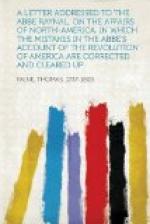Neither could it be said after this, that the legislature of that country any longer made laws for this, but that it gave out commands; for wherein differed an act of Parliament constructed on this principle, and operating in this manner, over an unrepresented people, from the orders of a military establishment?
The Parliament of England, with respect to America, was not septennial but perpetual. It appeared to the latter a body always in being. Its election or expiration were to her the same, as if its members succeeded by inheritance, or went out by death, or lived for ever, or were appointed to it as a matter of office. Therefore, for the people of England to have any just conception of the mind of America, respecting this extraordinary act, they must suppose all election and expiration in that country to cease forever, and the present Parliament, its heirs, &c., to be perpetual; in this case, I ask, what would the most clamorous of them think, were an act to be passed, declaring the right of such a Parliament to bind them in all cases whatsoever? For this word whatsoever would go as effectually to their Magna Charta, Bill of Rights, trial by Juries, &c. as it went to the charters and forms of government in America.
I am persuaded, that the Gentleman to whom I address these remarks will not, after the passing of this act, say, “That the principles of administration had not been changed in America, and that the maxims of government had there been always the same.” For here is, in principle, a total overthrow of the whole; and not a subversion only, but an annihilation of the foundation of liberty and absolute dominion established in its stead.
The Abbe likewise states the case exceedingly wrong and injuriously, when he says, “that that the whole question was reduced to the knowing whether the mother country had, or had not, a right to lay, directly or indirectly, a slight tax upon the colonies.” This was not the whole of the question; neither was the quantity of the tax the object, either to the Ministry, or to the Americans. It was the principle, of which the tax made but a part, and the quantity still less, that formed the ground on which America opposed.
The tax on tea, which is the tax here alluded to, was neither more or less than an experiment to establish the practice of a declaratory law upon; modelled into the more fashionable phrase of the universal supremacy of Parliament. For until this time the declaratory law had lain dormant, and the framers of it had contented themselves with barely declaring an opinion.
Therefore the whole question with America, in the opening of the dispute, was, Shall we be bound in all cases whatsoever by the British Parliament, or shall we not? For submission to the tea or tax act, implied an acknowledgment of the declaratory act, or, in other words, of the universal supremacy of Parliament, which as they never intended to do, it was necessary they should oppose it, in its first stage of execution.




